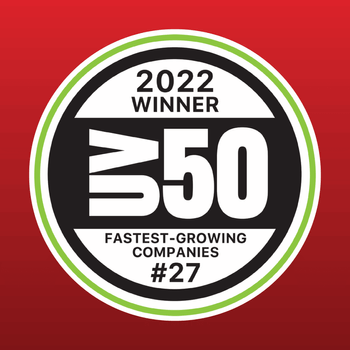by Ana Gotter • February 10, 2023
SEO vs PPC: Which is Better? How About Both!
Ah, the age-old dilemma of should I choose SEO or PPC? It’s wild that we’re still debating this topic after all of these years since both strategies have been around for such a long time.
Shall we FINALLY put it to rest?
When you’re sitting down to make a decision between two different options, you’re naturally going to ask the question “which is better?”
Which will get you better results, which will cost less, and which will make you more successful?
Plenty of decisions will have a clear answer to the “which is better” question. Choosing between two agencies, for example, or two different sales forecasting tools.
Marketing, however, is tricky, particularly when it comes to one of the most commonly-asked questions we hear: Which is better in the debate between SEO vs PPC?
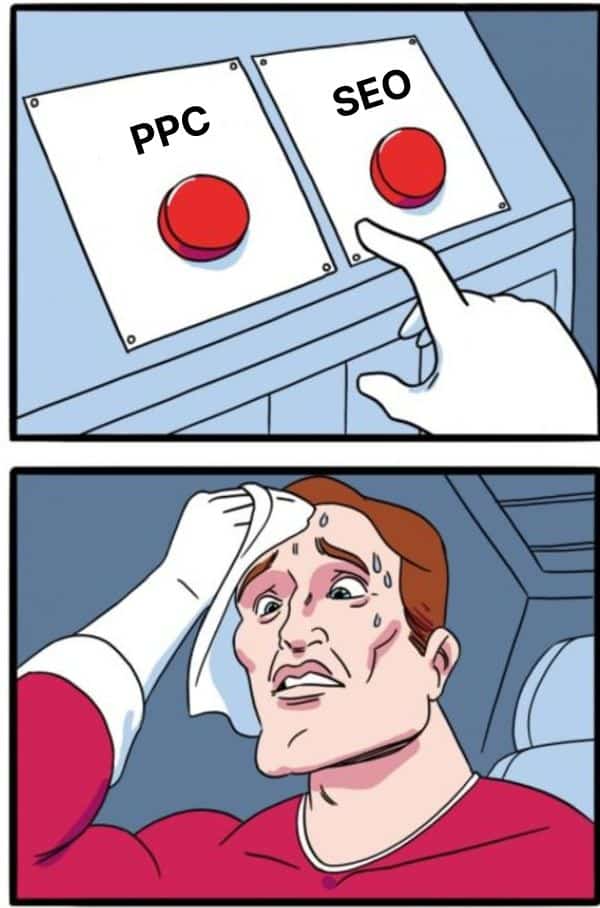
SEO and PPC both have their own very strong strengths and weaknesses, and in this post we’re going to go over the differences between them to help you determine which is better for your business.
To help you in your decision making, here’s another article we wrote defining the top 5 things you should consider when choosing PPC or SEO as your marketing strategy: PPC vs SEO: 5 Things To Consider
Table of Contents
- SEO: The Basics
- The Benefits of SEO
- The Challenges of SEO
- PPC: The Basics
- The Benefits of PPC
- The Challenges of PPC
- How Are SEO and PPC Campaigns Different?
- Which is Harder: PPC vs SEO?
- Is PPC Better Than SEO?
- Final Thoughts: Why You Need Both SEO and PPC
SEO: The Basics
Search engine optimization (SEO) is the practice of optimizing your website (or web assets)— and all of the content on it— to rank well in the search engines organically.
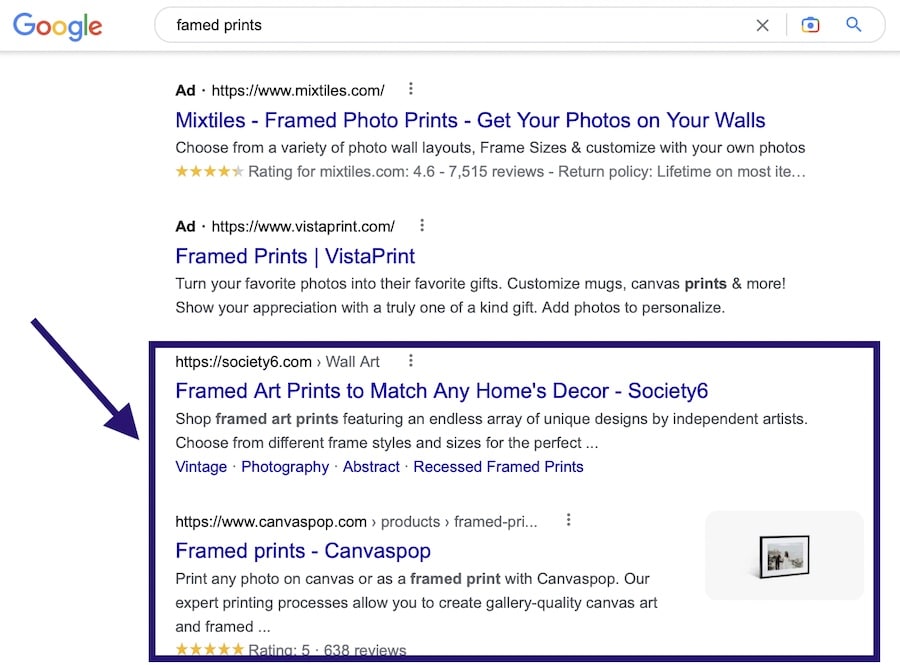
There are a lot of techniques involved to rank well in search engines, including the following:
- Conducting keyword research, finding target keywords for every page of your site that you can realistically rank for and that align with the purpose of the page
- Including those keywords strategically in your copy
- Writing meta descriptions and titles to make users more likely to click when they see your listing in the search engine results pages (SERPs)
- Boosting domain authority by getting backlinks from other trusted sites
- Increasing the “crawlability” of your site, which determines how much information Google can find on it (a common practice for this is using sitemaps and Schema markup)
- Optimizing your images in addition to the copy and site structure
- Resolving technical issues, like slow loading times or 404 error pages
You can see a breakdown of common SEO practices here:
If you need help with search engine optimization, check out our SEO services.
THE BENEFITS OF SEO
There are a number of benefits when it comes to SEO that brands should never overlook, including the following:
- You can show up in organic search results to connect with people looking for content like yours
- There’s enormous evergreen potential; while you may need to refresh content occasionally, a great blog post or site page can rank well for months or even years
- It’s “free,” at least once you implement it (though there are costs of SEO specialists, content creators, and keyword research tools to consider)
- You can target a large range of different keywords and search intents, allowing you to reach diverse audiences at different stages of their buyer’s journey
- Organic search results often have higher click-through rates (CTR) than PPC ads
THE CHALLENGES OF SEO
There are pros and cons of every marketing channel, and SEO is no different. These are the downsides to consider:
- When you’re up against tough competition and in heavily saturated industries, it can be extremely hard to rank; imagine being a new small shoe store trying to rank against Nike and Adidas for “sneakers” or “running shoes”
- It can be slow; SEO can sometimes take months to really be effective and show results, especially if you’re starting from scratch
- Google algorithms update frequently, and sometimes quietly; they may roll out changes that impact your page positions without a lot of notice
- Results can be long-term but they aren’t necessarily permanent; you’ll likely need to adapt to new changes and refresh older content to ensure it still ranks well
PPC Campaigns: The Basics
Pay-per-click (PPC) campaigns are any kind of paid advertising that allow brands to run ads online and pay for specific results. In many cases, as the name suggests, you pay for a click, but in some cases you may pay for actions like video views, a thousand impressions, or app downloads.
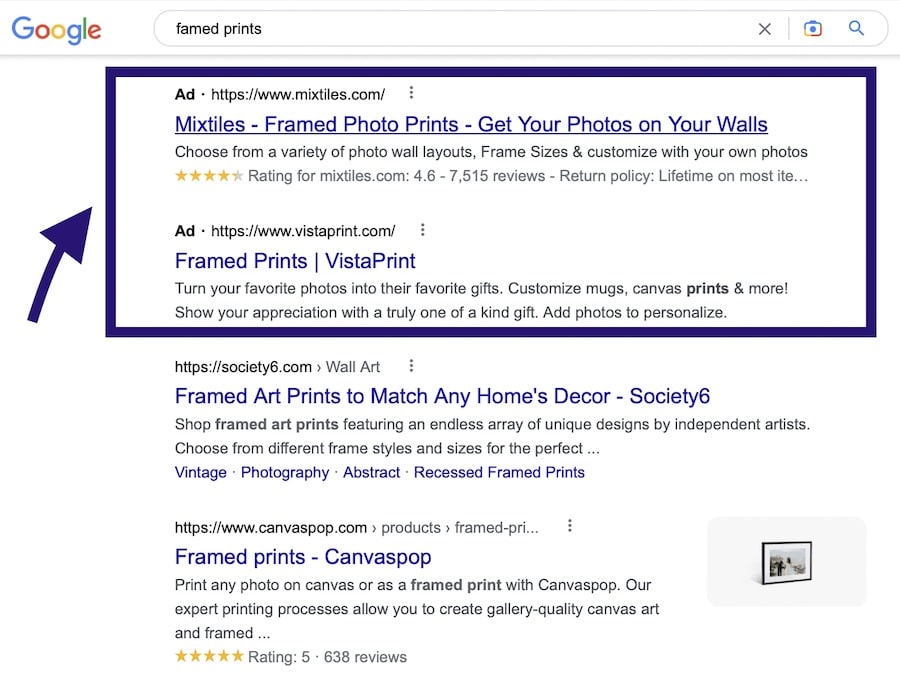
Some of the most popular PPC platforms include:
- Google Search Ads and Shopping Ads, which use keyword-based targeting to show your ad to users looking for products, services, or content like yours
- Google’s Display Ads, which are visual campaigns shown on third-party publisher websites and utilize demographic, interest, and behavior retargeting
Most PPC platforms offer self-service ad systems, allowing brands to determine who will see their ads and under what conditions. You can then set up the creatives that your audience will see, and even determine how much you’re willing to spend.
Many brands choose to use a variety of different ad platforms, like using Google to capture high-intent users and then using Facebook Ads or Google Display Ads for retargeting campaigns to keep them engaged.
For the purpose of this post, we know that people are going to be most focused on Search Ads, so you can get some insight into how they work here:
THE BENEFITS OF PPC CAMPAIGNS
These are the benefits of PPC campaigns that you need to know:
- It’s a pay-to-play system, so if you’ve got some marketing budget to spend and you want results, you can invest here and likely get results with a good strategy
- You can get results almost instantly, or at least start showing up in the SERPs very quickly
- Even if you’re up against tough organic competition, you can use ads to show up ahead of them— even using their branded keywords in some cases to appear before them in the SERPs when users search directly for them
- You can have multiple campaigns going at once to connect with users at different touchpoints; you can also use multiple campaigns to create extensive tests to learn more about your audience
- It’s much easier to conduct conversion-focused tests (aka A/B testing) with ad campaigns than often-static website pages
THE CHALLENGES OF PPC CAMPAIGNS
And now the downsides of PPC campaigns to consider when comparing PPC vs SEO:
- Results stop trickling in as soon as your campaigns stop, so you’re only getting results while actively paying
- Ad campaigns can be expensive, which can be a huge barrier for small businesses with tight budgets; in many cases, some platforms are getting progressively more expensive over time
- Different ad systems can be challenging for businesses to learn or manage
- Failed campaigns can lead to wasted ad spend (76% of ad spend is wasted!)
- Ad blockers (which are being used increasingly often) can reduce the number of potential placements or eligible placements
Most of the challenges of PPC campaigns can be combated with a strong, experienced agency. Check out our PPC services here.
How Are SEO and PPC Campaigns Different?
When it comes to PPC vs SEO, it’s clear that there are some huge differences.
Both can focus on increasing your visibility in the search results, expanding your reach overall, and driving meaningful traffic to your site. In most cases, both heavily incorporate keyword research and optimization.
That being said, they have stark differences to consider:
| Purpose | Cost | Speed | Long-term effectiveness | Higher Conversion Rate? | ||
|---|---|---|---|---|---|---|
| SEO | Rank as high as possible in organic search results, for relevant keywords to push awareness and sales | Free, unless working with specialists | Can take several months or even years to see big results | Yes, though content may need to be updated | Yes | |
| PPC | Rank as high as possible in ads above organic search results, drive clicks and conversions quickly | Pay per chosen action, like clicks, views, or app downloads | Can be immediate, as soon as same-day | No, results stop as soon as you stop paying | No |
If done right, SEO has the opportunity to generate more sales than PPC in the long run. But PPC does get you results faster.

WHICH IS HARDER: PPC VS SEO?
If you’re wondering which is harder in the PPC vs SEO debate, the answer is that both can be challenging in different ways.
SEO often takes much longer to see results, and while it may seem easy upfront, there’s a lot of “behind the scenes” technical requirements and strategy involved that can be incredibly difficult. There’s a lot that goes into it beyond just keyword selection, which isn’t a walk in the park in and of itself.
And knowing it takes so long to get results can be stressful for business owners. What if your chosen strategy isn’t a winner, and you won’t know for several months?
PPC campaigns, however, require a massive amount of knowledge themselves. You need to know about campaign best practices, which features to use, and keyword selection. It can also cost a pretty penny, so if you get it wrong, that ad spend can get chewed up fast.
For this reason, we often recommend that people work with an experienced agency that can help with both campaigns. Learn more about how we can help here.
Is PPC Better Than SEO?
This is another question we’re asked a lot, and the answer is “not necessarily.”
PPC can be superior to SEO in the following scenarios:
- You want results nearly immediately
- You need to show up higher in the SERPs than your competition, and you’re struggling to do so consistently or organically
- You need to attract more users at scale, and ideally quickly
- You want to reach users who aren’t yet on your site or know of your brand
- You want to retarget users who have interacted with your business before and who could use another nudge
That being said, SEO has its vital place in marketing. It’s a crucial part of a long-term marketing strategy, and it can yield significant evergreen results with proper maintenance even if it does take longer to show its potential.
Generally speaking, SEO hits on every part of the buyer’s journey. From top of the funnel down to the very bottom where you create life-long customer relationships. SEO is also extremely useful in generating new data that you couldn’t have received from PPC. You’ll discover new customer personas and understand which topics and pages align best with your ideal customer persona (ICP).
SEO is also not just about ranking on search engines like Google! You can perform SEO for Amazon, Etsy, YouTube, and practically any site that uses an algorithm to propagate results for the end-user. SEO is spread out far and wide, whereas PPC has its boundaries. Even highly-regulated industries like supplements are better for SEO campaigns since PPC has restrictions.
Final Thoughts: Why You Need Both SEO and PPC
You can say that your business needs one or the other, but preferably, you need BOTH! Sorry to shout, but it’s so true!
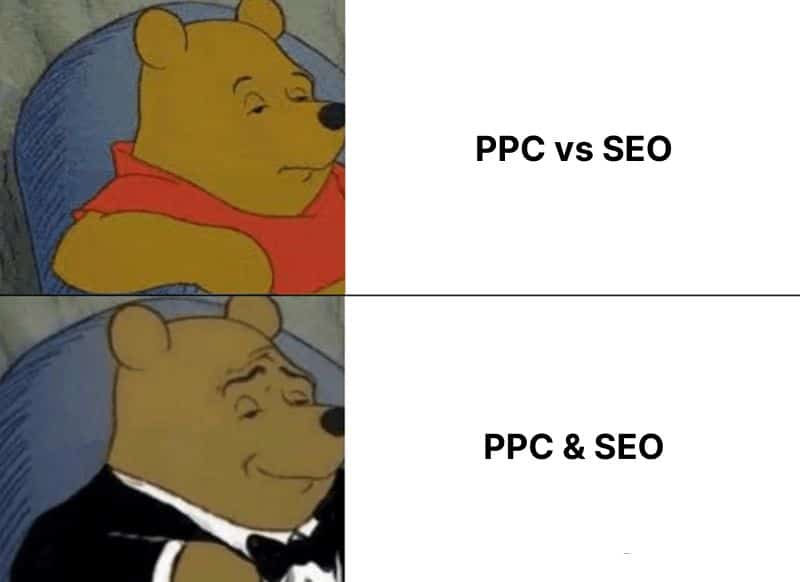
Want to combine SEO and PPC? That brings us to search engine marketing (SEM).
SEM is now coined as the practice of trying to appear higher in the SERPs to increase visibility both with organic marketing and paid advertising. So in the debate between PPC vs SEO vs SEM, SEM is the answer.
Utilizing both paid and organic search tactics will give you a full-funnel approach that will increase your success. You can capture audiences at multiple different touchpoints for multiple stages of the digital sales funnel, attracting users no matter where they’re at in their buyer’s journey.
This means more clicks, more users, more data, and more sales. Wins all around!
Need help with your SEM strategies? We can help. Get your free audit here.




